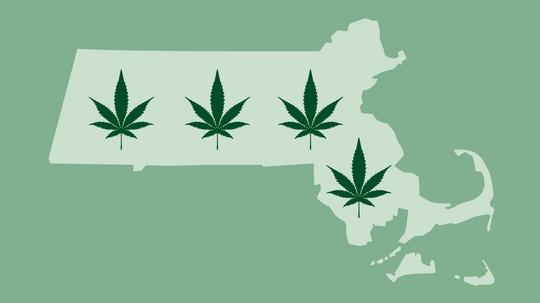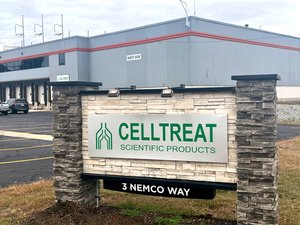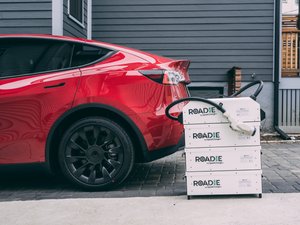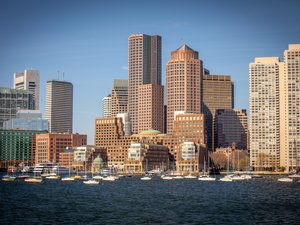
The regulatory environment around marijuana in Massachusetts is infamously unstable. In May, we speculated that the Bay State could be the next powerhouse for the cannabis industry. After all, that was the same month that the Brightfield Group, a Chicago-based cannabis research firm, projected that the state would be home to more than $2 billion in the recreational cannabis market alone by 2023—10 percent of the total market share, tied with New York and coming behind only California.
More recently, the same firm released a report projecting that the market for hemp-derived cannabidiol (CBD) would grow exponentially, reaching $23.7 billion nationwide by 2023. But Massachusetts may yet be cut off from that market. Last month, as the Boston Business Journal reported, state regulators with the Massachusetts Department of Agricultural Resource released guidance that outlaws the sale of all CBD-infused products and tinctures, forcing local businesses to take those products off their shelves.
So what's the deal? We wanted to take a look back at how the environment around marijuana in the Bay State has shifted over the last nearly three years, beginning with the public's vote to legalize recreational cannabis in November 2016.
Note: We'll go into more detail at our State of Innovation event on Thursday, where we'll be discussing the future of cannabis-related innovation in Massachusetts.
November 2016: Nearly 54 percent of Massachusetts voters approved Question 4, a ballot measure that called for legalizing recreational marijuana while regulating it like alcoholic beverages. According to the measure, a commission would also be created to regulate marijuana in the state.
December 2016: Adults 21 and over were officially allowed to possess and use small amounts of marijuana. An individual could also grow up to six plants in their own home—as long as they were kept locked up and invisible from street view.
December 2016: Gov. Charlie Baker signed a law that delayed key parts of the marijuana law governing retail pot shops, effectively pushing off implementation of sales by six months, to July 2018.
August 2017: Almost a year after the legalization vote, a 25-member Cannabis Advisory Board was set up based on the language from Question 4. According to MassLive reporting at the time, its members included Walpole Chief of Police John Carmichael Jr., who opposed marijuana legalization, and Kimberly Napoli, an attorney who co-founded a hemp-based clothing boutique.
September 2017: The Cannabis Control Commission, the regulatory body that now governs cannabis across the state, was set up. Over the next several months, they would develop regulations for the new and growing industry, including draft rules on cannabis cafés and other social venues that could sell the substance.
February 2018: Those draft rules—the ones that would govern home delivery, marijuana cafés, and yoga studios—were put on hold until the following year.
March 2018: The Cannabis Control Commission approved key adult-use regulations. Rules were officially outlined for medical marijuana inventory quotas, an economic empowerment program, a licensing and fee structure, and more.
April 2018: Applications were opened up for marijuana establishment licenses. Certain applicants could vie for priority certification on the basis that they were already registered marijuana dispensaries (through the previously established medical marijuana licensing program) or were Economic Empowerment Applicants, who demonstrated they could benefit communities disproportionately impacted by marijuana enforcement.
June 2018: The Cannabis Control Commission launched a social equity program, designed to provide entrepreneurship and work opportunities in the cannabis industry for those who had been disproportionately impacted by its prohibition.
October 2018: Four marijuana shops had their license applications approved. The commission granted a final retail marijuana license to a medical dispensary in Northampton owned by New England Treatment Access, while the other three licenses went to Cultivate Holdings.
November 2018: Two retail marijuana stores opened to the public. Separately, the Cannabis Control Commission authorized two independent testing laboratories, MCR Labs and CDX Analytics, to begin testing marijuana and marijuana products for the adult-use cannabis industry.
March 2019: Amid concerns over ownership and consolidation in the new marijuana industry, the Boston Globe's Spotlight team exposed that Sea Hunter, a subsidiary of TILT Holdings, and Acreage Holdings were flouting regulations stating that no company could own more than three marijuana shops in the state.
June 2019: The Cannabis Control Commission approved new draft regulations that would provide a framework for cannabis cafés and delivery services to operate in the state. A public comment period is open through mid-August.
June 2019: The Boston Business Journal reported that Massachusetts regulators outlawed the sale of products containing hemp-derived CBD. By July, local stores were forced to pull products off their shelves.
June 2019: State Rep. Mark Cusack, a Democrat from Braintree, proposed legislation that would undo that by categorizing CBD as an agricultural commodity. Hemp advocates, unsurprisingly, approved of the bill, which is currently sitting in the House Committee on Rules.








